The first time I tasted beer was in my grandmother’s kitchen. We were down from Connecticut in her front-to-back row house in the Flatbush section of Brooklyn on Easter Sunday. I was 4.
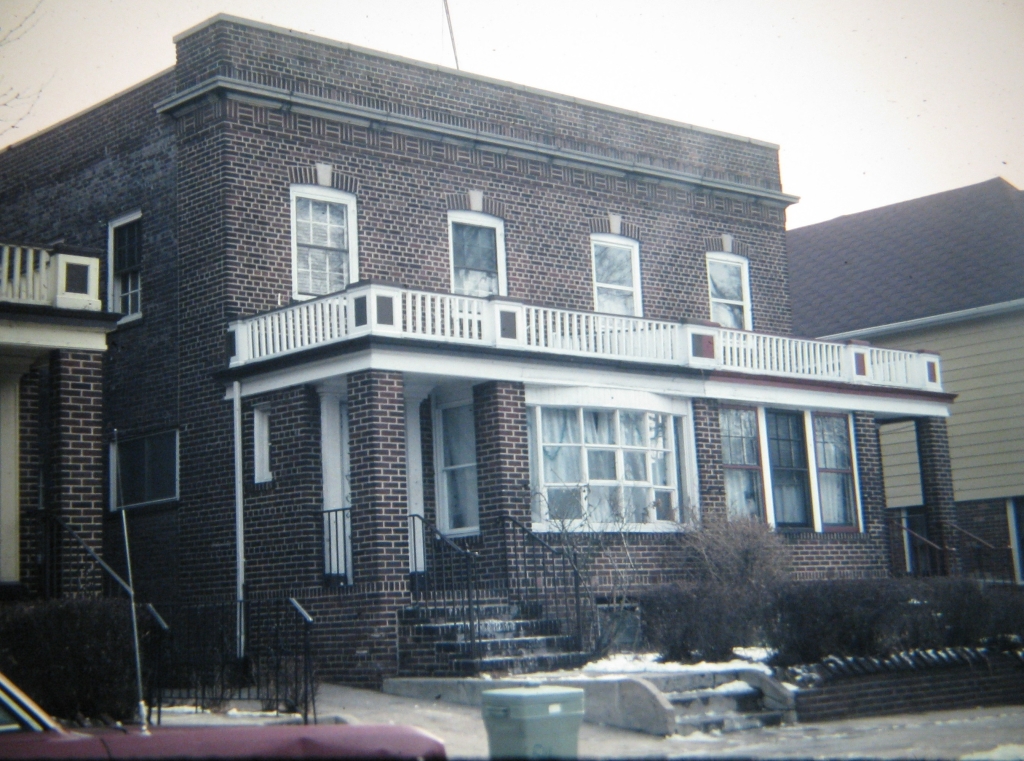
I had mixed emotions about going to my grandmother’s house on holidays. I loved my grandmother, of course. Her personality had a few layers of sternness that her grandchildren had to penetrate, but once we did, you could almost physically feel her love. We physically felt it when she pinched our cheeks.
I also loved to see my relatives. What I didn’t love was always being dressed for these occasions like, in my mother’s words, “a little gentleman.” And I wasn’t crazy about being paraded in front of the adults to be admired like a cow at the county fair.
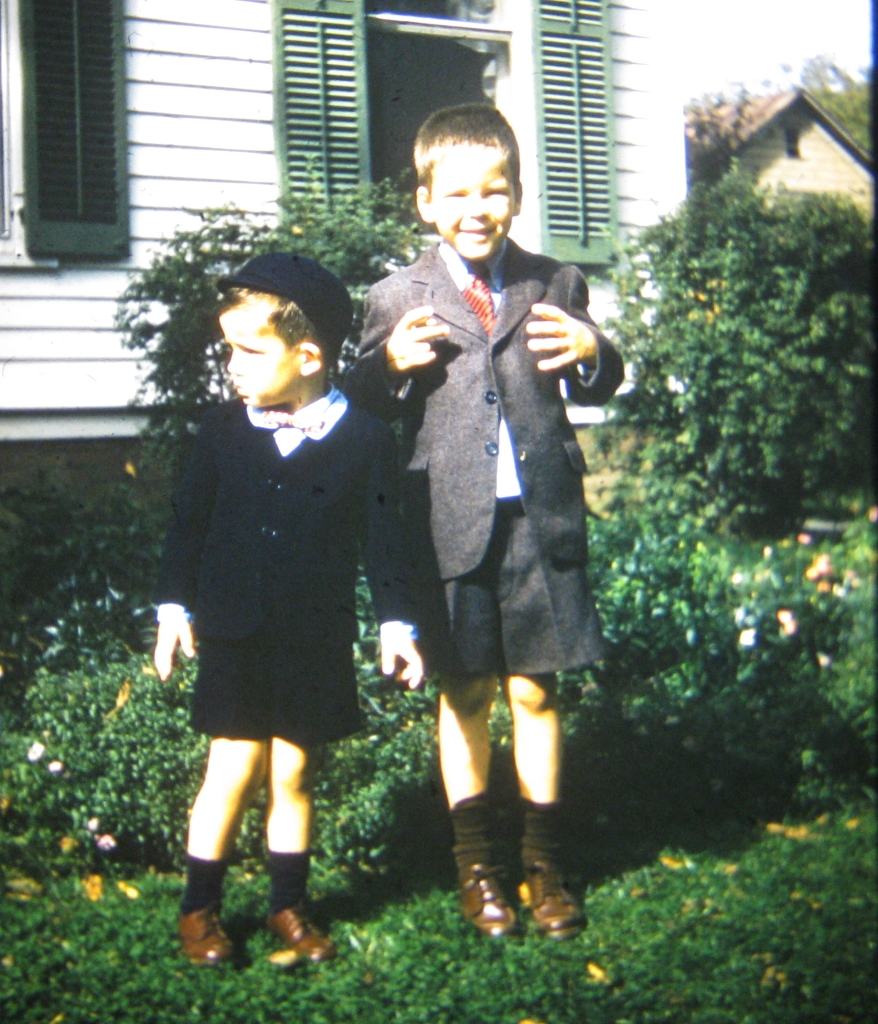
Luckily, the lineup didn’t last long. Pretty soon, the adults would get drinks and the conversation got loud and, to a kid, unintelligible. Too many adults, not enough kids. I’d get bored.
That’s when I’d wander upstairs to my mom’s and Aunt Aggie’s old room, which remained how it was when they were last living there, after college and before they got married in the 40s.
With the roar of conversation and glasses and ice clinking downstairs, the bedroom was so quiet in contrast. I would slide open each dresser drawer and find that the few contents – an old missal, a scapular, a hair brush – never changed from visit to visit.
After my ritual explore upstairs, I’d head down to the dark, dank basement and visit my grandma’s manual sewing machine. I was very pleased when, one year, I found that my legs were long enough to reach and operate the treadle. I’d also look over at the far front corner and think about my grandfather and how, when he was alive, he’d be in that space, making wine.
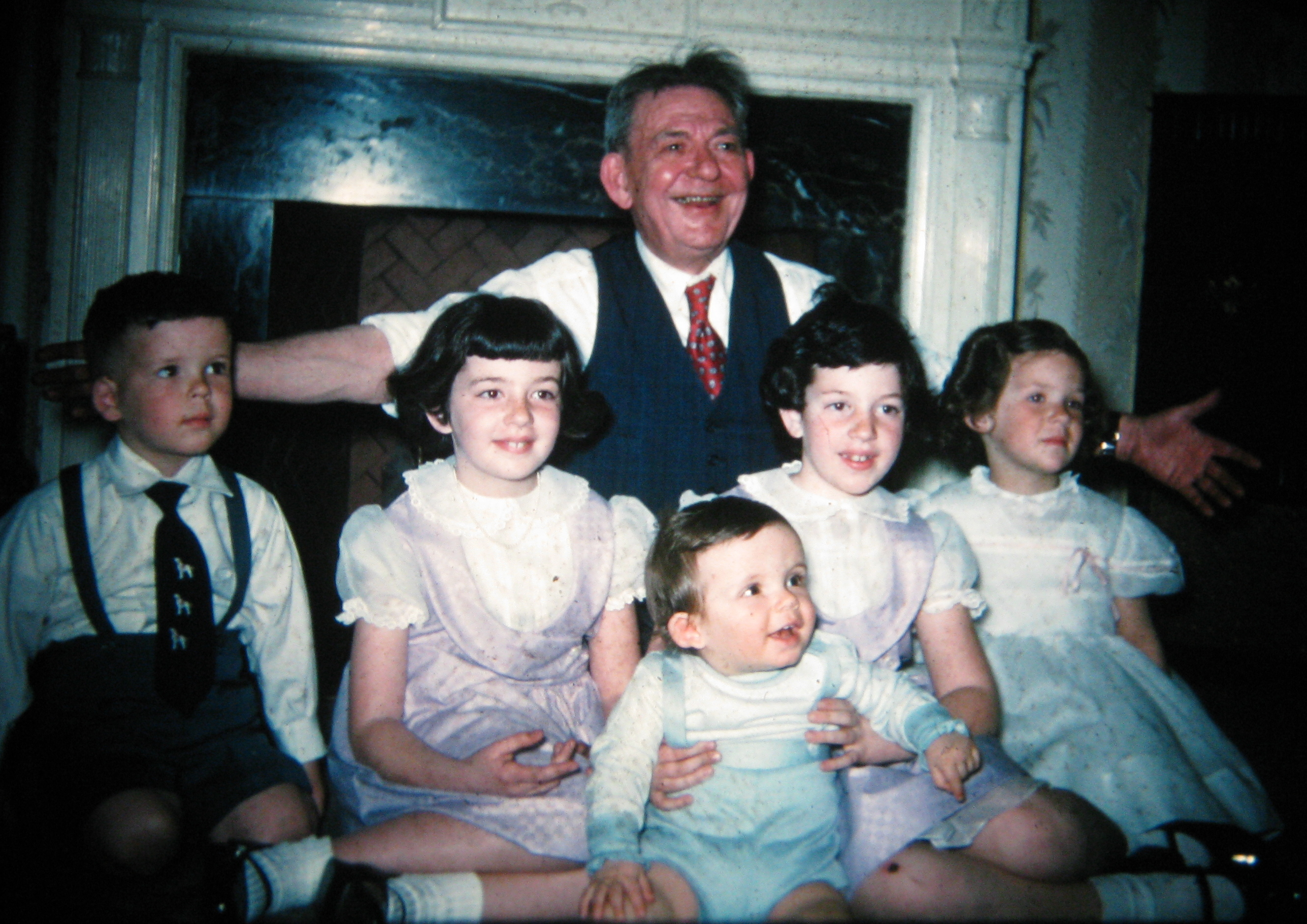
I loved the smell of the old house, especially those coming from the tight confines of Grandma’s kitchen. I learned, through experience, that a dinner of epic proportions would eventually be coming through that door. When I had first been allowed to sit at the big table with the big people, I made a youthful mistake.
After the antipasto, grandma brought out the biggest, most beautiful bowl of spaghetti I have ever seen. The abundant helping of thick red sauce – what the Brooklyn side of the family called gravy – which sat atop the pasta, looked as if a Gourmet Magazine art director had positioned it. So I ate. And when I was done, asked for seconds. The adults laughed. Grandma frowned at them and gave me more.
Then she disappeared into the kitchen and, in a few minutes, brought out the main course, the “secondi.” Which was a turkey. And ham. And vegetables. My mother gave me a look as if to say, “Now you know why they were laughing at you.” The spaghetti was just the primo course.
Then there was salad. Then cheeses. Then the sweets and coffee. Nobody had warned me that a Sunday Italian dinner was a marathon. And that you needed to pace yourself.
But on the Easter of my first encounter with beer, I was too young to explore more than the first floor. I wandered into the kitchen and saw my grandmother at the stove, her back to me. She was focused as she was entering the final hour of preparation of a six-course meal for sixteen and didn’t see me.
One of the male guests had just grabbed a beer from the fridge and noticed me as he was punching holes in the can. He smiled and wordlessly offered me a sip.
My grandmother must have sensed that offer because after a delay of 1.5 seconds, she broke her concentration and turned around just in time to see him help me lift the can to my lips. I took a drink.
“Heeeeyyy!” she shouted, which, with her accent, sounded like she said it in Italian. “What’s the matter with you?”
She vigorously waved a towel at the perpetrator as if she were fighting off an attack of hornets. “Get out of my kitchen.”
My grandmother turned back to her stove and stirred one of the pots and then came at me with a large spoon.
“Here, taste some of the gravy,” she said. “It will take some of that beer taste away.”
My grandmother needn’t have worried. I liked it. Even though I was just 4 years old, I’ll never forget the taste of that beer. A Ballantine Ale.
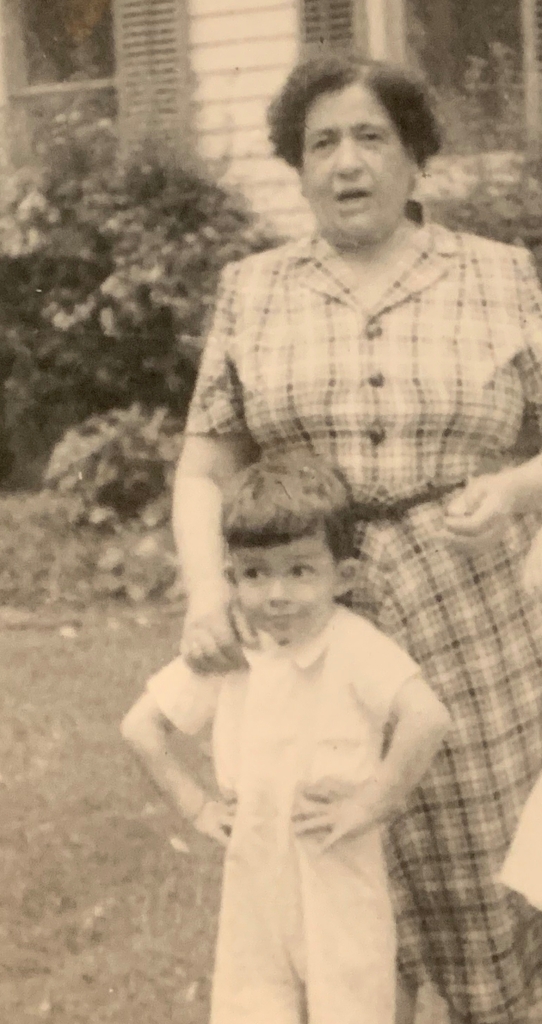
The first time I decided to drink on my own, I was 15 and I planned to do what a lot of kids do: raid my parents’ liquor cabinet. My plan was to pour a little out of each bottle in the cabinet into a flask and drink it before the next town dance to celebrate the end of football season.
But I didn’t have a flask. And at 15, had no idea how to get one. The week before the big night, getting one was all I could think about.
I even was thinking about it in the shower before school that Monday when, after rinsing the shampoo out of my hair, I opened my eyes and saw my 12-ounce bottle of Old Spice shampoo. It was shaped just like a flask. Perfect. Right in front of me all this time. And it was plastic so it wouldn’t break if dropped or sat on.
I simply had to empty it and rinse it out. Which I did, but it stilled smelled like Old Spice shampoo. So I rinsed it again. And again. In fact, the rest of the week, any free moment I had, was spent rinsing that bottle.
At the end of the week, there was still a faint odor of the shampoo, but I figured there was no way there was any shampoo left in the newly anointed flask. I was wrong. I don’t remember much about that night except the awful taste of the concoction of the booze that still had hints of Old Spice (a scent that I used to love). And I remember having to leave the dance very early. Because I got sick.
I swore off the hard stuff for a long time after that. And alcohol in general for six months. But then it was spring and I was so much wiser then. I thought. A bunch of us decided to meet in the cemetery near the Center to have a couple of beers to celebrate the end of baseball season. But getting alcohol and getting that alcohol to another location wasn’t easy without a car or driver’s license.
On this night, I walked up my street to the main drag, Farmington Avenue, and then walked another four blocks to Roger’s package store (a package store was about the only place to buy booze in Connecticut, a state that was still honoring many of the laws enacted in the eighteenth century).
Even though I was starting to shave and my voice had changed, I had just turned 16 and did not look close enough to the legal drinking age to buy beer on my own. So I stood at the edge of the store’s parking lot and tried to guess who might be willing to take my $1.25 and buy me a six-pack of Schlitz.
Eventually, a guy in his mid 20s, who had been in my position just a few years before, agreed to buy for me. Until my stubble got thicker and darker and I was able to buy on my own at certain locations the following year, that’s the type of guy I’d target to buy for me.
Once in a while, an older, seedier type – guys who looked as if they just escaped the city jail – would buy for me if I kicked in and paid for their booze, too. We called them balkies.
Once I had my beer, I headed back to Farmington Avenue and caught a bus for the two-mile ride to the Center. The adults on the bus seemed to be focused on my brown paper bag. I felt like the narrator in Poe’s Tell-tale Heart: It was all I could do to not scream out “Yes! I did it. I had someone buy me the six-pack that is so obviously wrapped in this brown paper bag.”
When I got to the center, I met my friends at the predetermined headstone. We hadn’t been drinking long when there was a lull in the conversation that allowed us to hear others guys talking. And we saw a flash of light. By the sounds of their voices, we determined the voices belonged to minors who were drinking illegally. So were we. But that was OK. Because it was us.
I decided to make use of my recently acquired adult voice to scare these kids away.
“Hey!” I intoned. “You kids. What are you doing here? You don’t belong here. Leave your beer and get out of here or I’m calling for back up.”
The other group was silent. Then there was a bit of whispering. Then finally one of them responded.
“Hey, Sivell. Is that you?”
Turns out, most of the rest of the team had made plans to drink beer at the cemetery. Until we got our cars, that was a favored place to drink.
That was sophomore year. Junior year, when I was with Bethani, I only drank on the rare occasions I wasn’t at practice or with her.
Senior year, I didn’t drink at all during football season because that was forbidden. If you got caught, you were tossed off the team immediately, no questions asked, no matter how good you were. And then you were nobody. The high school scarlet letter.
We didn’t always follow the rules, but only the truly stupid went against Coach Robinson. He was the type of coach you never wanted to disappoint.
So that year, we waited until after the last game and that night we started drinking and kept on drinking all year. The yearbook described me as “hub of the action.” I didn’t try to earn that reputation. It just happened.
When I wasn’t with my usual group of friends, I fell in with the jocks who called themselves the “Juicin’ Squad.” Of course, juice was booze. Just like “microscope material” was code for cigarettes when we were in junior high, in case our parents or nosey siblings were listening on the extension line.
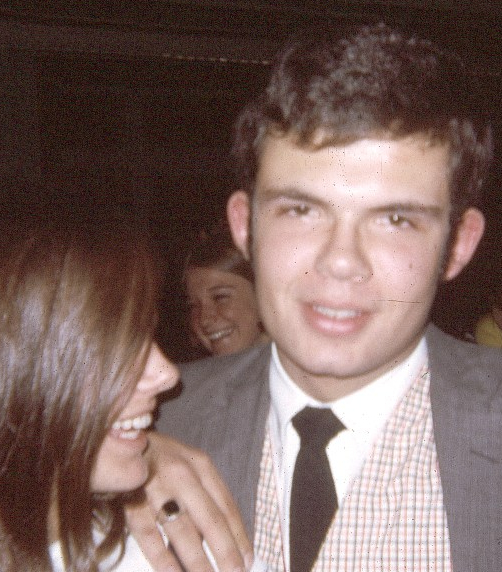
I don’t know how I fell in with them. Maybe because I looked older and could buy beer at some locations such as the liquor stores near from Trinity College. Maybe because I had my own car. In high school, there was often a catch to a relationship.
I was never part of the inner circle. But I was pretty friendly with a couple of charter members like Jay Hershman, who I had known since 7th grade. And that circle was a bit empty during the basketball season because several of their guys – including Jay – were on the team. So I filled in.
Our routine was to get drunk, go to the basketball games and behave obnoxiously. As I was louder and even more of a wise guy when I had a few drinks and fewer inhibitions, they liked having me around. Plus, as I say, I had a car.
On game nights, we’d get out of the house soon after dinner and meet up as early as we could before a game. We’d buy a 6 pack apiece and down as many as we could as quick as we could, offering encouragement to anyone who was slow.
And it wasn’t positive encouragement. “Come on, you drink like a girl!” was the popular motivator. Although the language was a bit coarser. And it was a bit ironic because some of the girls we hung out with could drink more than we could. Usually we had time to drink at least 3 beers before tip off. That was the minimum to get our cheering squad lubricated.
We’d go to all the games, home and away, often getting lost on the way to the out of town games, but the longer the time on the road, the more beer we were able to drink. Considering how my brother died just the year before, it’s hard to believe I did any of this. But I did and it helps me see how stupid kids can be. Because what about the kids who have no painful lesson to guide them? My 17-year-old brain was at least 10 years away from maturity.
At one home game, I was very loud and very cutting. Abusive. A ref was the target. I was sure he was costing us the game. And at that moment, it was the most important thing in my life. He kept looking into the crowd to see who was saying these terrible things. I kept shooting my mouth off and I kept hitting the target.
Late in the game, the ref spotted me and signaled that he wanted me out. The bleachers were crowded so I hid behind the guys and watched the game from beneath and between their heavy duffle coats. The teacher who came looking for me couldn’t get to me. Maybe I had gone too far. Hell, of course I had. But after the game, I went out and finished my 6-pack.
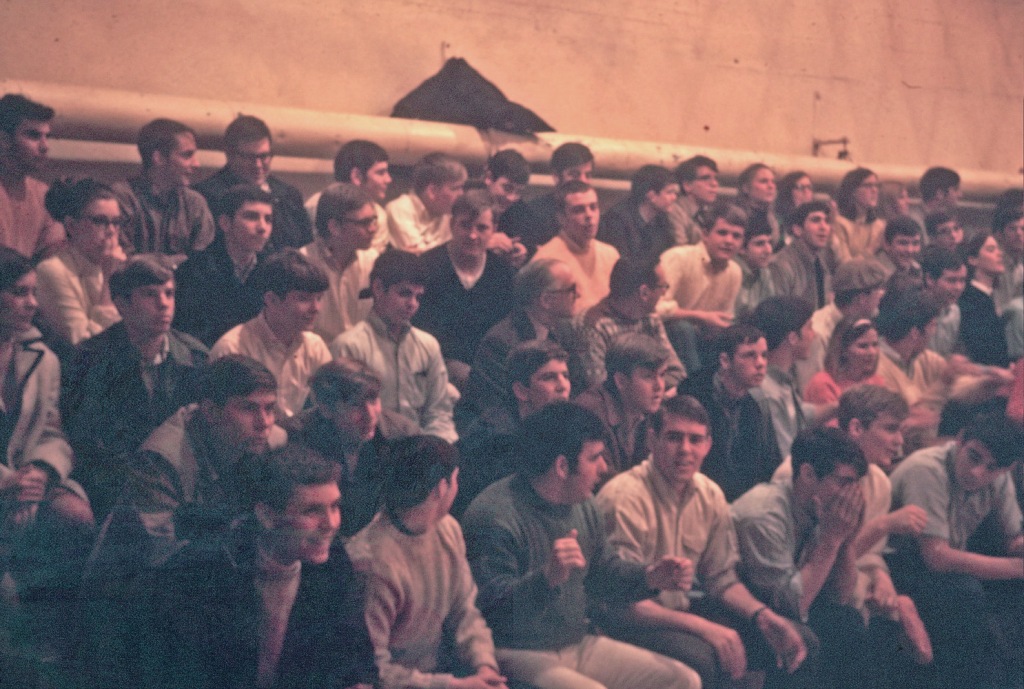
Sam told me her parents liked her going out with me because I was such a gentleman and that they felt that they could trust me. And that was generally the right feeling for parents to have about me. I wasn’t going to harm their daughter in the way that most parents worry about their daughters out on dates.
But I was drinking and driving. By spring, three to five times a week. And not just at night. I was out of control but most people had no idea. I didn’t.
Baseball season began and I knew it might be my last shot to ever play the game. So I worked hard and finally made the team, starting in right field. Yes, I was the 9th guy in the lineup but I was starting.
I ran all the laps I was supposed to run, taking no shortcuts. While there are gifted kids who are good at every sport, I was not good at any sport. I wasn’t even like Ernie or Tehan, who were kind of gawky at ball sports but good at football. My short, stumpy body just wasn’t built to be an athlete.
I helped organize a couple of fundraisers for the team, including a big town dance and we had enough money for a pitching machine. With that machine, something finally clicked in my head about hitting. Or maybe it simply was knowing the ball wasn’t going to hit me in the head as Coach Fitz would invariably come close to doing when he was throwing batting practice. I could never tell if it was an accident or on purpose.
I was able to translate what I had learned in the batting cage to live pitching. When we started playing, I found I could see the ball all the way in to the bat. I started to hit. It was a revelation.
Success on the field, however, didn’t translate to success in the classroom because I had been too busy drinking, socializing and – since the girls still had to wear skirts to school – staring at Sam’s legs in World History class. I had done marginally better academically over the winter semester, but then spring fever hit. My third quarter grades were terrible: 2 Ds and 2 Fs.
That meant no baseball. I was academically disqualified.
I had to tell Coach Fitzpatrick the next day. I approached him at the start of practice, dressed in my street clothes. While the other guys were warming up, I broke the news, figuring it was a lot harder on me than him.
After three years of football and baseball together, I knew I was not Fitz’s kind of guy. He was the young, good-looking phys. ed./driver’s ed. teacher who had played minor league ball. He liked the guys with genuine athletic skill. I wasn’t one of those. He liked rah-rah guys. I wasn’t one of those, either.
But as I was telling him the news, he reached out and put an arm around me and pulled me close to him. He was slowly shaking his head while I finished talking. I didn’t know what was coming as I’d never been that close to a coach without him yelling at me.
But I needn’t have worried. Fitz told me that he knew how hard I had worked to make the team that year. He knew I ran all the laps. And that the team owed a lot of the success of our fundraisers for the pitching machine to me. He said I had made a big contribution even before the season started.
In the one moment of genuine understanding between the two of us in three years, he said was truly sorry I would not be on the team. Then he took his big mitt, his calloused pitching hand, and put it around the back of my neck and squeezed, just enough to cause pain but not quite enough for me to cry out.
“Now don’t be stupid,” he said, pushing me away as he let go. “You’re a whole lot smarter than this. Learn from this.” Then he turned and walked back to practice.
That year the team went 3-23. I am under no illusion that my bat would have made much of a difference. We were not a baseball school. In my 3 years there, we only won 8 games.
Earlier that day, Dr. Dunn had called me down to his office and told me I was not going to graduate if I didn’t raise all four grades. Doom was so mad when he saw the grades, he didn’t speak to me for a week. I think Mom did only because Doom wouldn’t.
You’d think disappointing the caring adults in my life and getting booted off the team would set me straight. It didn’t.
Dave Cole and I kept right on drinking. Yeah, the basketball season was over, but that didn’t mean we couldn’t enjoy a few beers … between classes. We used to leave school after first period because we had 2nd off and we’d get in his car, drive 2 blocks to his parents’ house – they were both at work – and straight into his garage. Then we’d drink 2 or 3 beers in that hour.
We thought we were so smart. The old pull-into-the-garage trick where no one can see what you are doing. We did it at my parent’s house during spring break while they were gone and we were tired from our temporary jobs of unloading boxcars for a furniture store. Although occasionally, we moved the party inside.
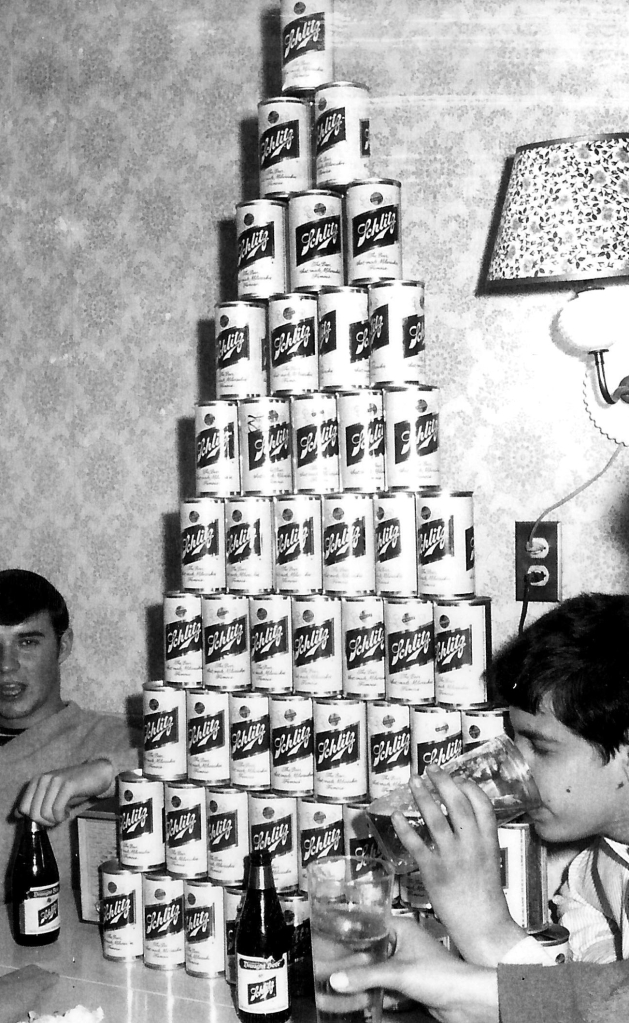
The turning point came one day after a visit to Dave’s garage. I was sitting in my 3rd period class daydreaming about the usual – baseball and girls – while Miss Papa was explaining cosines in trigonometry. I looked up front to see Jay Hershman trying to catch my attention. He was slowly waving his hand in front of his face, signaling he could smell my beer breath up front. If he could, I figured, so could the teacher. She was only two feet in front of him.
Suddenly, it finally dawned on me that maybe I wasn’t so smart and I was in danger of the everyone finding out what I was doing. And most importantly, Dr. Dunn, who had championed me when my teachers and coaches hadn’t. It FINALLY dawned on me that I might be out of control and on the path to ruin.
Luckily, I was sitting next to the window and I spent the rest of the class breathing out the window. I’m sure Miss Papa thought I wasn’t paying attention. I was. But not to trig. I was paying attention to not getting caught.
I stopped going to Dave’s garage for beers at 9 a.m. and I stopped hanging out with the juicing squad. I didn’t stop drinking, but I kept it to the weekends. Sam had been pretty tolerant of my behavior, but was disgusted with my grades. Bob didn’t care about my grades, but had been pretty disgusted with my behavior, abandoning, as he said, my true friends.
Since I wasn’t on the team and had nothing to do after school, Sam and I went to the library or my house every afternoon that spring to study. Thanks to her, I raised my grades in all subjects. And thanks to all my positive, in-school activities and decent SAT scores, college wasn’t ruled out.
Next week: Chapter 23. School is Out.
Categories: My story


Wow! I never drank a beer until my sophomore year in college when 18 was the legal drinking age.
I am not proud. What I did in high school really stunted the start of my adult life. Remember, I was a rookie reporter in my late 20s while the others were in their early 20s.